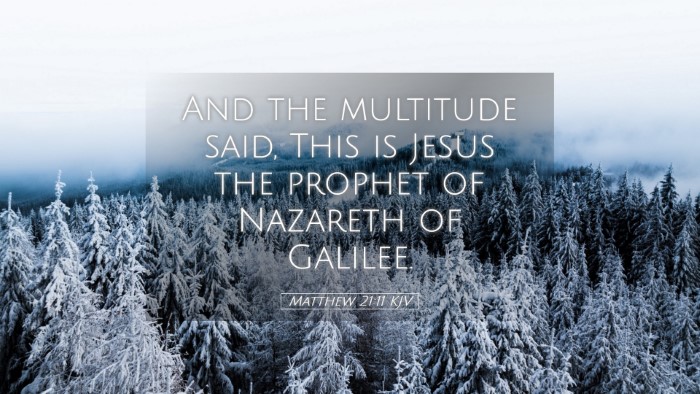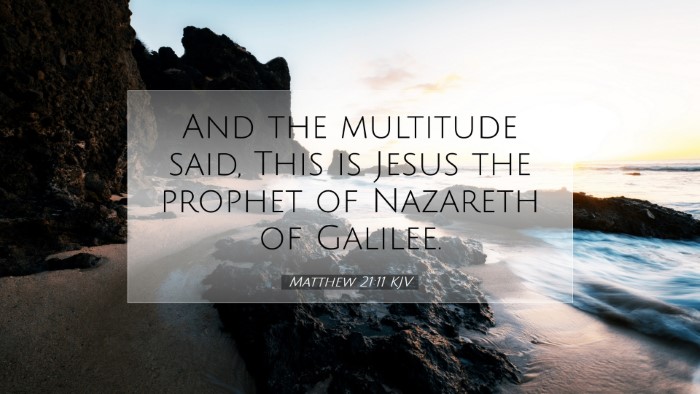Commentary on Matthew 21:11
Verse Reference: Matthew 21:11
Text: "And the multitude said, This is Jesus the prophet of Nazareth of Galilee."
Introduction
The context of Matthew 21:11 occurs during the final days of Jesus’ earthly ministry. Having entered Jerusalem in a triumphant procession, He was hailed by the crowds who recognized Him as a significant prophet. This moment marks a profound recognition of His authority and an affirmation of His prophetic role. Commentaries by noted biblical scholars shed light on this momentous event and its implications for understanding Christ's mission.
Contextual Analysis
Understanding the immediate and broader context of this verse is crucial. The preceding verses detail Jesus’ entry into Jerusalem, which is celebrated with shouts of exultation. The recognition that Jesus is “the prophet of Nazareth” reflects both fulfillment of Old Testament prophecy and the people's expectation of a messianic figure.
Historical and Cultural Background
The mention of Nazareth signifies its humble origins, alluding to Isaiah 53:2, which describes the Messiah as having no attractive form. The crowds, in their unrefined understanding, acknowledge Jesus as a prophet, a title laden with expectation and zeal, but lacking the full comprehension of His divine identity.
Insights from Commentaries
Matthew Henry
Matthew Henry emphasizes the public acknowledgment of Jesus' prophetic ministry. He notes that the multitude's assertion encapsulates their recognition of Jesus not merely as a teacher but as a divinely sent messenger. Henry reflects on the excitement of the crowds, who were perhaps drawn by Jesus' miracles and authoritative preaching.
Albert Barnes
Albert Barnes provides a detailed exposition on the term "prophet." He indicates that the people viewed Jesus largely through the lens of their expectations—a prophet like those of the Old Testament, who performed wonders and spoke for God. Barnes argues that while the title reflects a measure of respect, it also reveals the limitations of the crowd's perception, as they did not fully grasp Jesus' messianic identity or divine sonship.
Adam Clarke
Adam Clarke highlights the significance of the phrase “of Nazareth.” He interprets it as a rhetorical device that underscores the contrast between Jesus' lowly origins and His profound impact on history. Clarke suggests that this acknowledgment serves as an ironic foreshadowing of the rejection Jesus would soon face from the very ones who hailed Him as a prophet, illustrating the fickleness of public opinion.
Theological Implications
This verse serves as a focal point for several theological discussions:
- Identity of Christ: The recognition of Jesus as a prophet sets the stage for the deeper revelation of His nature as the Messiah and Son of God. This transition from prophet to divine king invites further exploration of Christ's dual nature.
- Prophetic Role: The acknowledgment of Jesus as a prophet reminds contemporary readers of the continuity of God’s revelation through human instruments. It raises questions about the role of prophets in the New Covenant.
- Expectations of the Messiah: The multitude's acclaim is a lens through which we examine the expectations of Jesus' contemporaries, challenging modern believers to assess their own understanding of who Jesus is.
- Human Response to the Divine: The crowd's reaction exemplifies the human propensity to align with divine truths, but also the danger of superficial faith—highlighting the need for deeper understanding and commitment.
Conclusion
Matthew 21:11 encapsulates a pivotal moment where recognition of Jesus' prophetic ministry converges with the popular expectations of the time. By engaging with the insights of esteemed commentaries, we gain a multi-faceted understanding that enriches our theological reflections. For pastors, students, theologians, and scholars, this verse serves not only as a historical reference but also a call to deeper contemplation of Jesus’ identity and mission.


